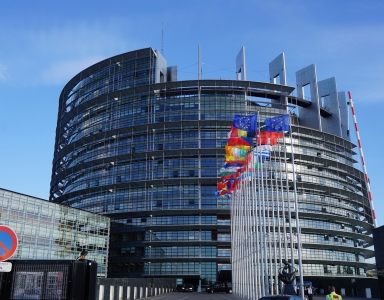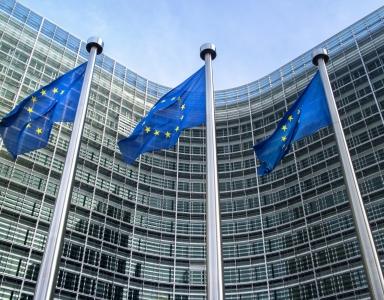EU Programs and opportunities for security and defence
The European Union (EU) has developed various programs and initiatives focused on security and defense to enhance its strategic autonomy, improve its military capabilities, and ensure the security of its member states. Let’s delve into some – not all – of these programmes.
European Defence Fund (EDF)
The European Defence Fund (EDF) is the European Commission’s key initiative to support collaborative research and development of defence capabilities within the EU. The EDF accelerates defence capabilities by funding collaborative research, promoting cross-border cooperation, strengthening the industrial base, and supporting dual-use technologies. Through joint projects and innovation, it enhances Europe’s self-sufficiency in defence production and fosters interoperability across Member States. Click here to find out more about the European Defence Fund.
EDF & PESCO
The European Defence Fund (EDF) and Permanent Structured Cooperation (PESCO) are two distinct EU initiatives focused on developing defence capabilities, but their interplay is interesting. The legal and institutional frameworks of these initiatives differ. PESCO operates under an intergovernmental framework, while the EDF follows the EU Community Method, which emphasizes integration under supranational guidance. Due to these differences, any linkage between them cannot be of a legal nature.
Synergy between the EDF & PESCO
The EDF aims to foster innovation and strengthen the European Defence Technological and Industrial Base (EDTIB) by widening cross-border cooperation among defence SMEs and mid-caps. PESCO focuses on enhancing military capabilities and operational readiness at the EU level. Partial integration allows the EDF to support PESCO through the PESCO bonus, potentially triggering specific projects. Full integration requires strong political commitment for joint projects under both frameworks. Alternatively, in a no-linkage scenario, the EDF could serve as an alternative if PESCO fails to deliver key capabilities. While the objectives of the EDF and PESCO align, their distinct legal and institutional contexts necessitate flexible approaches to maximize their synergy.
Internal Security Fund
The Internal Security Fund (ISF), established for the period 2021-2027, aims to enhance security within the EU. The primary objectives are to prevent and combat terrorism, radicalisation, serious and organised crime, and cybercrime; to assist and protect victims of crime; and to prepare for, protect against, and manage security-related incidents, risks, and crises. Click here to read more about the Internal Security Fund.
NATO Security Investment Program (NSIP)
The NATO Security Investment Program (NSIP) is a key initiative aimed at enhancing the security and defense capabilities of NATO member states. It primarily supports infrastructure projects related to security and defense that benefit multiple NATO member countries. Eligible projects include the construction, renovation, or upgrade of military facilities, communication networks, airfields, and other critical infrastructure. The budget for the NSIP varies annually. The funding is allocated to specific projects based on NATO resource requirements and priorities.
What defines the success of NSIP projects?
The success of NSIP projects is evaluated based on several factors. These include operational impact, where projects should enhance NATO’s operational capabilities, readiness, and response time; interoperability, where infrastructure improvements should promote interoperability among NATO forces; cost-effectiveness, where projects are assessed for their cost-effectiveness and long-term benefits; timeliness, where completing projects within specified timelines is crucial; and security enhancement, where projects must contribute to overall security and defense objectives.
Strengthening NATO
NSIP plays a vital role in strengthening NATO’s collective defense by investing in critical infrastructure. Its success lies in improving capabilities, fostering cooperation, and ensuring efficient resource utilisation.
DIANA
DIANA, the Defence Innovation Accelerator for the North Atlantic, is a NATO initiative aimed at sourcing future capabilities from dual-use innovators. Any incorporated company headquartered in a NATO member nation is eligible to participate in a DIANA challenge. DIANA accepts proposals from all companies meeting the basic eligibility criteria, but early-stage start-ups or small and medium-sized enterprises (SMEs) with limited experience in defence and security benefit most from the unique DIANA Accelerator program. By fostering collaboration and innovation, DIANA aims to address critical defense and security challenges, promoting the rapid development and adoption of cutting-edge technologies.
DIANA for mature technologies
DIANA seeks technology solutions at maturity levels of TRL 4 and above, though lower TRL solutions with potential disruptive impact are also considered. Collaborative proposals are accepted, provided that all member companies meet the basic eligibility criteria. In terms of funding, grants are provided to awardees, with each selected company receiving € 100,000 for the first six months of the program.
DIANA’s Collaborative Innovation and Success Strategies
DIANA collaborates with leading innovators, from early-stage start-ups to mature companies, focusing on data, AI, autonomy, quantum technologies, biotechnology, energy and propulsion, novel materials, hypersonics, and space. It leverages a network of accelerator sites and test centres across the Alliance. DIANA’s success lies in solving major defense and security challenges by connecting Allied military and governmental end-users with dual-use and deep tech innovators. The Rapid Adoption Service (RAS) helps Allied national entities quickly develop and procure promising solutions.
Comprehensive EU Security and Defence Initiatives
The European Union (EU) has developed a comprehensive approach to security and defence through various programs and initiatives. Military Mobility enhances rapid movement of military assets, reflecting the EU’s commitment to protecting its member states and contributing to global security. The initiatives highlighted above aim to enhance strategic autonomy, improve military capabilities, and ensure the security of EU member states through collaborative research, cross-border cooperation, and strengthening of the industrial base. Additionally, there are numerous other defence and security funding programs available in Europe, including – but not limited to – the Preparatory Action on Defence Research (PADR), the European Peace Facility (EPF), and the European Union Satellite Centre (SatCen).
Do you want to know more about EU Security and Defence programs and opportunities or are you interested in one of the initiatives above? Don’t hesitate to reach out to us, our specialists are happy to help. Send an email to info@hezelburcht.com or call 088 495 20 00.




